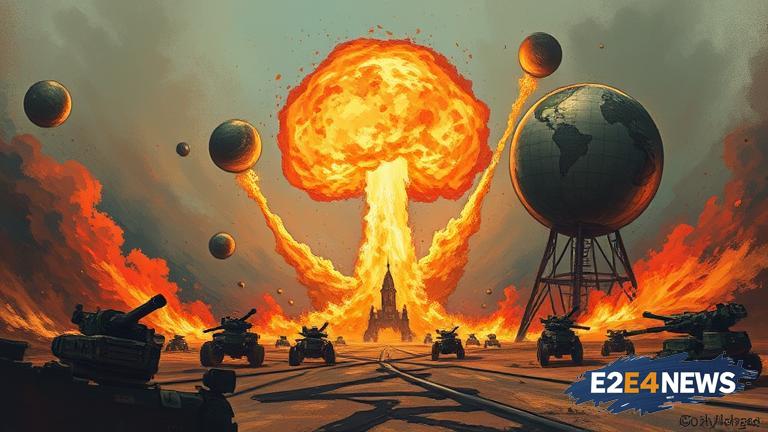The world is witnessing a significant escalation in tensions between the United States and Russia, with the Trump administration’s policies on nuclear arms and Russia sparking concerns of a new arms race and increased risk of nuclear war. The Intermediate-Range Nuclear Forces Treaty, a landmark agreement signed in 1987, has been scrapped, and the US has begun developing new nuclear-capable missiles. This move has been met with criticism from experts and world leaders, who warn that it could lead to a destabilization of global security and increase the risk of nuclear conflict. The US has also announced plans to withdraw from the Open Skies Treaty, which allows for aerial surveillance of military activities, further straining relations with Russia. The Russian government has responded by announcing its own plans to develop new nuclear-capable missiles, sparking fears of a new arms race. The consequences of such an arms race could be catastrophic, with the potential for nuclear war and devastating consequences for the environment and human populations. The Trump administration’s stance on nuclear arms has been widely criticized, with many experts arguing that it is driven by a desire to assert US military dominance rather than a genuine concern for national security. The US has also been accused of hypocrisy, given its criticism of other countries’ nuclear programs while pursuing its own. The international community has called for calm and restraint, with the United Nations warning of the dangers of nuclear war and urging countries to work towards disarmament. Despite these warnings, the US and Russia continue to engage in a war of words, with both sides accusing each other of aggression and provocation. The situation is further complicated by the presence of other nuclear-armed states, including China, France, and the UK, which could potentially be drawn into a conflict. The economic consequences of a new arms race could also be significant, with the potential for increased military spending and decreased investment in other areas. The environmental impact of nuclear war could be devastating, with the potential for widespread radiation poisoning and long-term damage to ecosystems. The human cost of nuclear war would be catastrophic, with the potential for millions of deaths and widespread suffering. The world is at a critical juncture, with the need for diplomacy and cooperation more pressing than ever. The US and Russia must work towards a resolution to the current crisis, rather than engaging in a dangerous game of brinksmanship. The international community must also play a role, urging restraint and promoting dialogue between the two sides. The consequences of failure could be catastrophic, and it is imperative that world leaders take immediate action to reduce tensions and prevent the outbreak of nuclear war. The clock is ticking, and the world holds its breath as it waits to see what the future holds. The threat of nuclear war is real, and it is up to world leaders to take action to prevent it. The time for diplomacy is now, and the world must come together to prevent the devastating consequences of nuclear conflict. The US and Russia must put aside their differences and work towards a common goal of disarmament and cooperation. The future of humanity depends on it. The world is watching, and it is up to world leaders to take action to prevent the unthinkable. The threat of nuclear war is a ticking time bomb, and it is up to us to defuse it before it’s too late.
